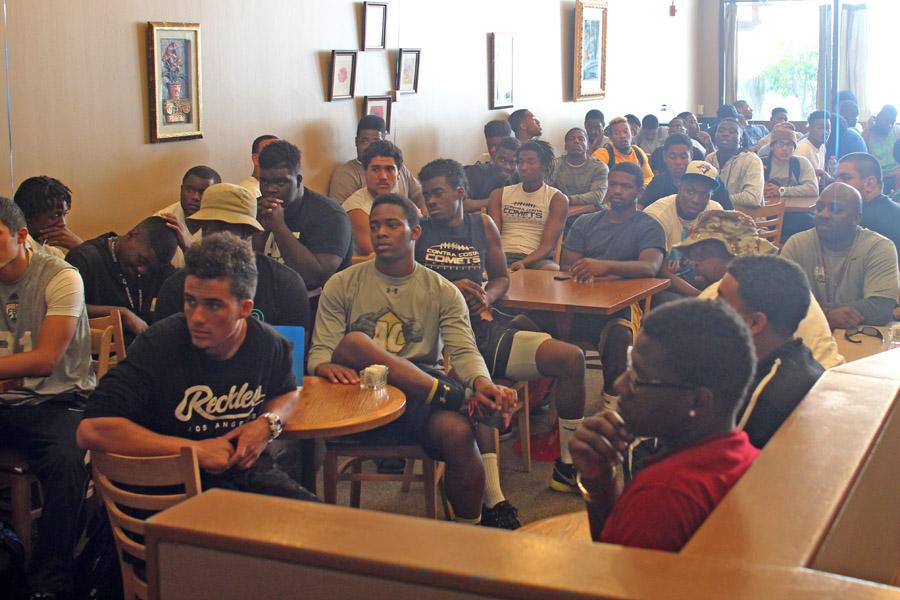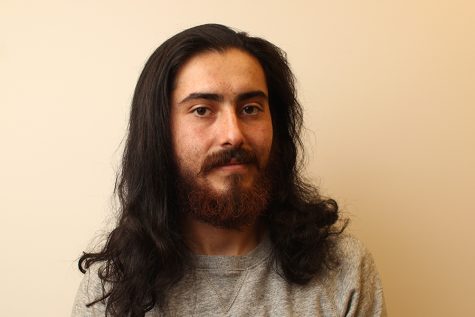Shifting ‘tenacity’ shown on field into academics
African-American Staff Association held an annual welcome reception to showcase college resources
Christian Urrutia / The Advocate
Students listen to speakers during the African-American Staff Association event in the Three Seasons Restaurant on Sept. 3.
Sep 9, 2014
Political science adjunct professor Rome Mubarak stood behind the podium in the Three Seasons Restaurant Wednesday and uttered the word, “Tenacity.”
He described it as a quality that many athletes have during big games, but not as often in their important academic endeavors.
“The same tenacity you (student/athletes) show during big games should not be left on the field,” Mubarak said. “You need that aggression and need to focus it in your academics. You need a back up plan.”
He spoke at the African-American Staff Association’s welcome reception held to inform new students about various academic and financial resources available statewide and on campus. The event organizers also hoped to encourage students to take advantage of the opportunities available to them during their time at Contra Costa College.
While the event’s promotional flyer invited all new African-American students, the 70 students in attendance were all male athletes.
Football coach Alonzo Carter said he ended his practice early so the team could come and show its support of the event while also being informed about academic resources available .
Faculty, staff and administrators told students about the different programs and people on campus that are available to help them. Then the culinary arts department served a buffet for all in attendance.
Some spoke about how college is a means that allows students to grow and become more involved in the surrounding community. Other speakers used alumni as examples of how success is determined by a student’s support system.
Athletic Director John Wade said the reason for holding the event was to help new students navigate their way smoothly through their short stay at the community college by using state-funded support programs and advice from faculty and others on campus.
“Events such as these provide opportunities,” Wade said. “(These are) great opportunities that students should take advantage of because you only get so many (opportunities) in a lifetime. Unfortunately, those opportunities will slip out of your hands if you don’t grip onto them.”
An example is Extended Opportunities Programs and Services (EOPS), a state-funded program for low-income students who qualify to receive scholarships, book grants, and academic guidance from counselors, in person.
Science Technology Engineering Math grant (STEM) and METAS program Manager Mayra Padilla told the group the qualifications required for a good-paying job have changed immensely in only a few generations.
“Jobs out there are not the jobs of the past,” Padilla said. “Going to college was not a necessity for your parents to raise you.”
She said most high-paying jobs now require applicants to have a bachelor’s degree in some sort of science or technology. The expectations in a constantly changing job market are the driving forces for colleges statewide to develop stronger support systems for students.
Mubarak said events like these are important because historically, African-American students are under-represented at four-year colleges and universities. Contributing to this problem is a lack of adequate academic support at the two-year level to help these students transfer to a four-year college.
“It is good for (them) to see someone of their likeness having the necessary tools for success. Especially graduates or faculty.”
He said CCC is on the verge of creating a cohesive system for under-represented students who are moving out of a low-income community.
“We want the students to come to campus and have a sense of extended family.”
Liberal arts major Donald Keys, a member of the CCC football team, was among the crowd listening to the various speeches. Keys said the event gave him helpful information about where to go for academic and financial guidance on campus so he can transfer to a four-year university.
“They (speakers) told us about the different resources available so we (students) can stay involved and keep motivated in our classes,” Keys said. “I came to (CCC) because I heard a lot of good things about the teachers and (their) programs, and it’s true.”



